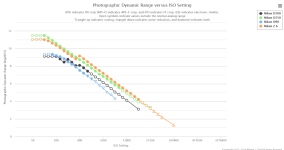There is something important missing in this thread....what do you shoot? Does Fx aid or hinder that subject type?
Due to larger photo sitesm the D700 has a little, better signal to noise ratio is better by 1/2 a stop with the D700 in Fx mode but in Dx mode in case you are using Dx lenses, the D90 has better dynamic range and color depth throughout the ISO range. Both cameras are clearly weaker in dynamic range than newer cameras. At low ISO, the D90 is better in DR in both Dx and Fx mode.
Consider a D700 as end of life meaning most parts are no longer available from Nikon.
If you are staying with Dx lenses( by far the most expensive part of FX), a unused D7200 would beat the D700 in all criteria from detail, DR, high ISO, color depth etc.
If you shoot sports or wildlife, stay with DX. A D90 is a very competent camera with the only weakness is topping out at ISO 6400 but the noise at 6400 is only one stop lower than a D700 so neither is a low light camera. I have a D90 with 330,000 frames, almost 3 times the expected shutter life and it is still quite competent if decent lenses are used. Some of my my admired portraits and landscapes were taken with a D90 mated to decent lenses
The D700 is built really well but is heavier and larger, a little better AF module but with a lot more focusing points. At the time it was pro build and better weather sealing but is getting old enough that any defect will either be unrepairable due to lack of parts or high labor costs. Any repair that required cracking the case is $300 minimum for labor alone. So consider it a disposable camera.
How much is the used body and what focal length FX lenses would you need to buy. Remember, DX telephoto lenses are 50 more "reach", for the same field of view on a Fx. So telephoto lens for say 200mm on field of view you have on your D90, will require a much larger more expensive, heavier/larger 300mm lens on Fx.
IF you are mostly interested the landscape, FX has some real advantages.
If you are interested mostly in improved image quality and do not have fast primes, invest in those, a much better return on investment. For example a 85 1.8G used for $375 mounted on your D90 will mage that combination a great portrait kit. If you do not have lighting such as speed lights, umbrellas, light stands, and light portraits or interior shooting, get 1 or more speed lights($50), modifier($20), stand($20) and your current camera will beat almost any casual non augmented light setup. Top quality portraits can be done with almost any camera with good lighting and a little imagination.
So, please reply with what you want to shoot and what is expected from any improvement. Camera bodies are almost the least impact on image quality.

